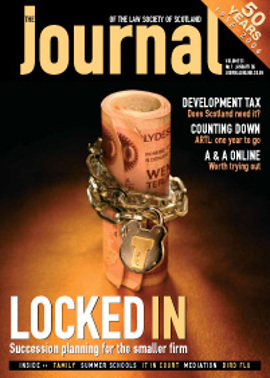Will less mean better?
2005 was a bad year for European integration. Two of the founding members of the EEC, France and the Netherlands, voted convincingly in referenda against the proposed constitutional treaty. Haggling over the size and content of the budget for 2007-2013 has dominated the subsequent “whither the EU” debate. The oil price rise seems to have put back any hopes of strong economic growth in the Eurozone. All this has diminished confidence within the EU institutions, and bolstered those at home who wish to reduce, not increase integration between EU societies and economies.
What impact will this have on the law? The reason for the EU’s singular success to date as a regional economic integration body is its firm base in law, correctly foreseen by the drafters of the original treaties as necessary to break down the natural tendency of states to protect their own industries.
The success of economic integration led to the spread of EU law into other areas. Chief among these has been the environment, where an estimated 80% of legislation affecting Scotland has its origins in Europe, but similar approaches to harmonisation have been taken in fields as diverse as health and safety, transport, consumer protection and now justice and home affairs.
Not all people see this in a positive light. Business, particularly in the UK, has complained that the degree of EU-wide regulation has gone beyond that which is strictly necessary to break down barriers and is now harming competitiveness. EU business organisations, while backing implementation of internal market commitments, are now joining in, calling for alterative approaches such as self regulation. Where regulation is required it should be based on objective scientific fact and independent impact assessment, proportionate, and adopted at the appropriate level.
The Commission responds
Shaken by the impact of the referenda, and determined to demonstrate the commitment of EU leaders to the competitiveness and growth agenda, the Commission in the autumn set out a deregulation plan which promises to reduce rather than grow the EU statute book. Enterprise Commissioner Verheugen announced plans to withdraw 68 legislative proposals not yet approved by the Council or Parliament, and then a three year plan to simplify, repeal or rewrite over 200 EU laws. This includes the following components:
- repealing laws which have become “irrelevant or obsolete”, such as 28 directives dealing with car parts, which are now regulated by the UN Economic Commission;
- “sunset clauses” (provisions that automatically terminate a law after a certain date) or review clauses to new proposals;
- codification, e.g. 45 directives on cosmetic products into one text;
- rewriting existing laws to clarify and improve consistency;
- more use of co-regulation, e.g. by promoting standardisation in areas such as product safety and IT;
- replacing directives with regulations to avoid member states adding extra administrative burdens to directives when transposing them.
Scope and impact
The exact scope and impact of the deregulation measures is still to be tested. The Commission has been at pains to deny that they might lead to a lessening of social and consumer protection. There are however indications in other fields that the impact might be to limit harmonisation where industry does not believe it will work in the interests of competitiveness and growth. The most important recent example concerned the ambitious proposals for a Community-wide system of regulation for chemical products (termed “Reach”). After sustained business lobbying, supported by key member states including the UK, original proposals to require companies to register some 30,000 chemicals with a new EU agency, and demonstrate that they posed no threat to human health and the environment, were watered down so that a much smaller number would require testing.
It remains also to be seen whether there will be an impact on internal market measures, despite the Commission’s stated commitment to shield these from the deregulation wave. EU lawmaking has always been based on a balance of interests characterised by dealmaking, one member state often being cajoled despite its better judgment to support a measure in return for a commitment to support its interests in another area. If environmental, social or consumer protection standards are being downgraded in importance, some states might be less willing to agree to harmonisation measures which might undermine their own system of social protection. The key litmus test here will be the fate of the Services Directive (see The Journal, March 2005, page 54) where pressure from France in particular about the impact of service providers in countries with lower levels of social protection might lead to serious restrictions in harmonisation in an area considered crucial to the further development of the single market. The fate of this and similar measures in 2006 will give us a clue as to whether the EU has found a new motor in deregulation or whether it is simply a precursor to the roll back of the high days of the Single Market.
Colin Imrie is a former diplomat and Commission official, and is now Director of the consultancy Eurosolution.com Ltd
In this issue
- Pressing ahead
- Regulation, 2006 style
- Held to ransom?
- A world turned upside down
- Quiet revolutions
- For supplement read tax
- Why mediation is a bad idea, and other myths
- Advice in a Europe of many notions
- At the touch of a button
- What sort of courts do we want? (And when?)
- KM in practice
- If the bug bites
- Refreshing risk quiz
- The partnership must go on
- First duty to the court
- A difficult birth
- Nuclear power no thanks?
- Due diligence
- Will less mean better?
- Scottish Solicitors' Discipline Tribunal
- Website reviews
- Book reviews
- Back to the future
- Users' IT requirements for ARTL






